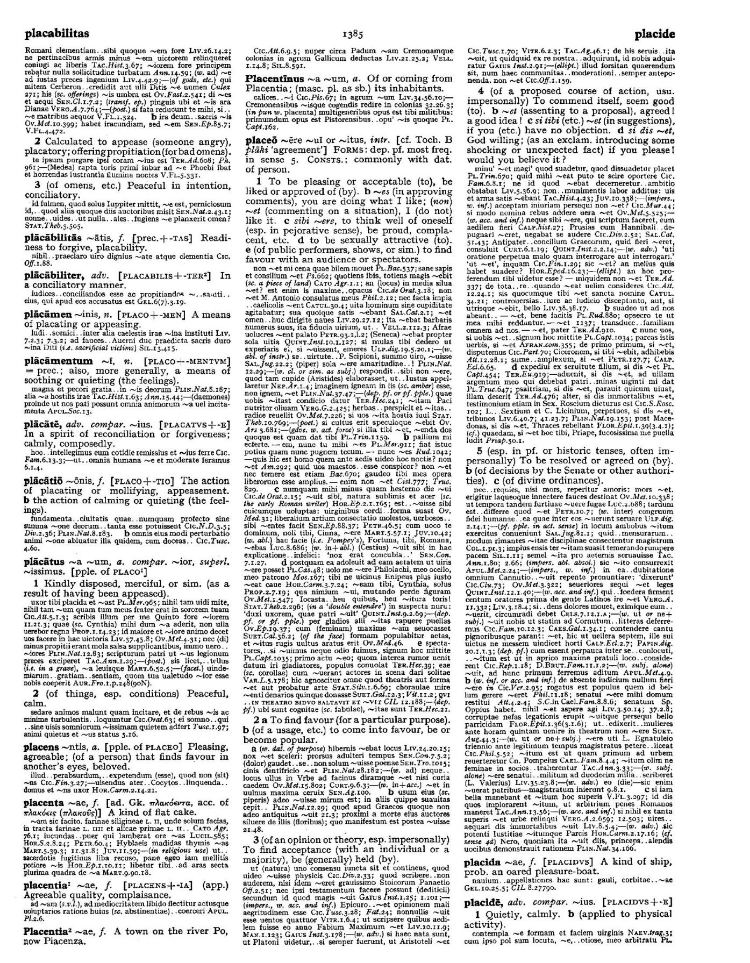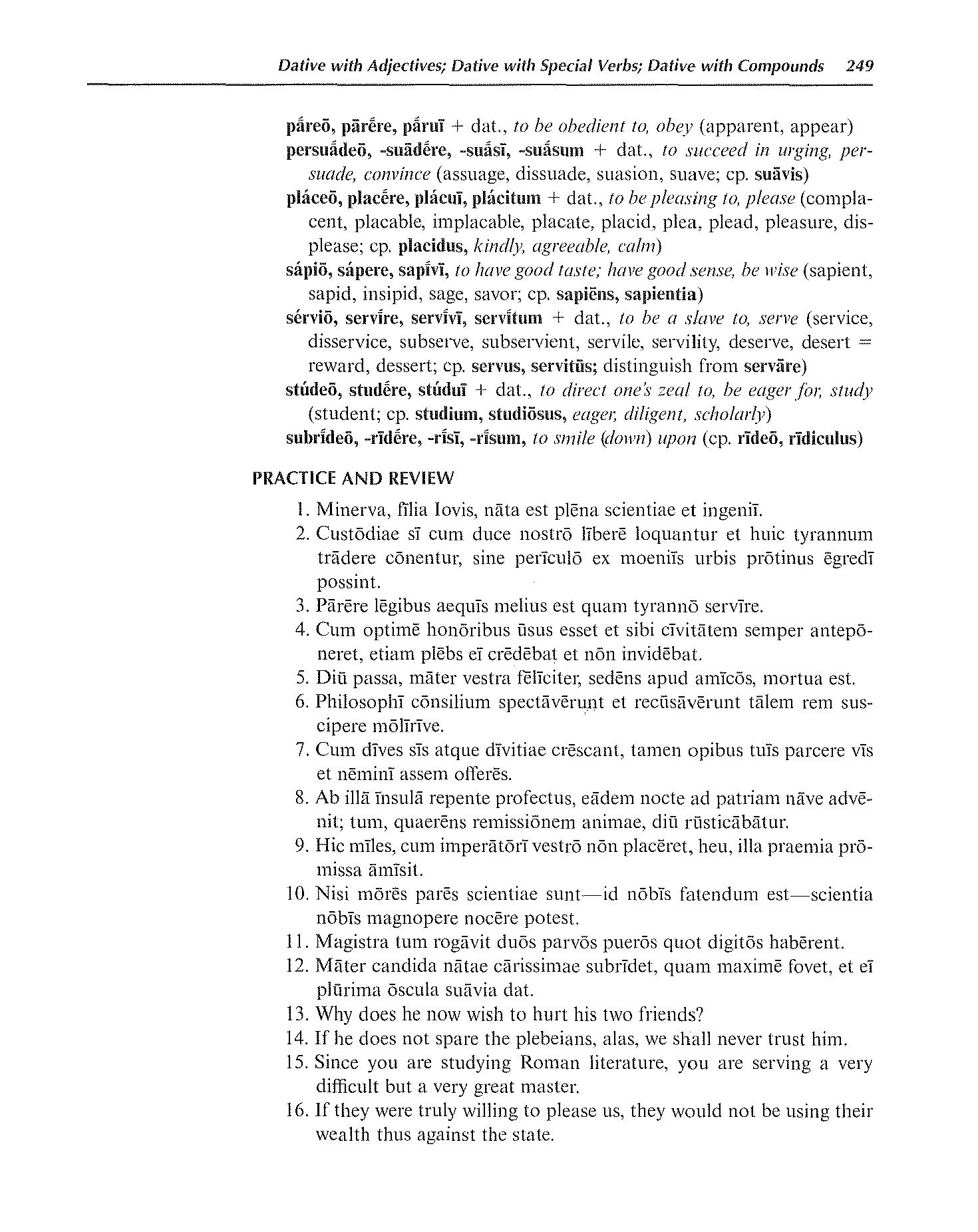
page_listing.tpl
page_subListingDetails.tpl
sub_listingDetails_style1.tpl
sub_listingDetails.title.tpl
placēre to please
placēre is a Latin Verb that primarily means to please.
Definitions for placēre
Wheelock's Latin
Verb
- 1
+dat., to be pelasing, please
English derivatives:
complacent placable implacable placate placid plea plead pleasure displease
Oxford Latin Dictionary
Verb
- 1
To be pleasing or acceptable (to), be liked or approved of (by). (b) ~es (in approving comments), you are doing what I like; (non) ~et (commenting on a situation), I (do not) like it. (c) sibi ~ere, to think well of oneself (esp. in pejorative sense), be proud, complacent, etc. (d) to be sexually attractive (to). (e) (of public performers, shows, or sim.) to find favour with an audience or spectators.
- 2
(a) To find favour (for a particular purpose). (b) (of a usage, etc.) to come into a favour, be or become popular.
- 3
(of an opinion or theory, esp. impersonally) To find acceptance (with an individual or a majority), be (generally) held (by)
- 4
(of a proposed course of action, usu. impersonally) To commend oneself, seem good (to). (b) ~et (assenting to a proposal), agreed! a good idea! (c) si tibi (etc.) ~et (in suggestions), if you (etc.) have no objection. (d) si dis ~et, God willing; (as an exclam. introducing some shocking or unexpected fact) if you please! would you believe it?
- 5
(esp. in pf. or historic tenses, often impersonaly) To be resolved or agreed on (by). (b) (of decisions by the Senate or other authorities). (c) (of divine ordinances).
Sentences with placēre
Latin to English
Nisi Caesar cīvibus placēbit, vītae eius nōn parcent.Compare If Caesar does not please the citizens, they will not spare his life.
Parentibus placitum domum vēnērunt.Compare They came home to please their parents.
Placere occepit graviter, postquam emortuast. [Plocium]Compare I began to like her tremendously once she died.
Totum muneris hoc tui est, quod monstror digito praetereuntium Romanae fidicen lyrae: quod spiro et placeo, si placeo, tuum est.Compare It is all of thy free gift that the finger of the passer-by points me out as the tuner of a Roman lyre. Breath of song and power to please, if please I may, are alike of thee.
Nulla placere diu nec vivere carmina possunt quae scribuntur aquae potoribus.Compare No poems can please long, nor live, which are written by water drinkers.
Placeo omen, inquam; huc dirigo navis.Compare The omen is pleasing, says he; steer the ships to this point.
Hic vos bellum et pax porto; uter placeo, sumo.Compare We bring you here peace and war; take which you please.
Conjugation table for placēre
Cactus2000
| ACTIVE | |
| Indicative present | Indicative imperfect |
| placeō placēs placet placēmus placētis placent | placēbam placēbās placēbat placēbāmus placēbātis placēbant |
| Indicative perfect | Indicative pluperfect |
| placuī placuistī placuit placuimus placuistis placuērunt / placuēre | placueram placuerās placuerat placuerāmus placuerātis placuerant |
| Indicative future | Indicative future perfect |
| placēbō placēbis placēbit placēbimus placēbitis placēbunt | placuerō placueris placuerit placuerimus placueritis placuerint |
| Subjunctive present | Subjunctive imperfect |
| placeam placeās placeat placeāmus placeātis placeant | placērem placērēs placēret placērēmus placērētis placērent |
| Subjunctive perfect | Subjunctive pluperfect |
| placuerim placueris placuerit placuerimus placueritis placuerint | placuissem placuissēs placuisset placuissēmus placuissētis placuissent |
Infinitive present placēre Infinitive perfect placuisse Infinitive future placitūrum esse | Imperative present placē placēte Imperative future placētō placētō placētōte placentō |
| Indicative present | Indicative imperfect |
| - - placētur - - - | - - placēbātur - - - |
| Indicative perfect | Indicative pluperfect |
| - - placitus est - - - | - - placitus erat - - - |
| Indicative future | Indicative future perfect |
| - - placēbitur - - - | - - placitus erit - - - |
| Subjunctive present | Subjunctive imperfect |
| - - placeātur - - - | - - placērētur - - - |
| Subjunctive perfect | Subjunctive pluperfect |
| - - placitus sit - - - | - - placitus esset - - - |
Infinitive present placērī Infinitive perfect placitum esse Infinitive future placitum īrī | Imperative present - - Imperative future - placētō - - |
| PARTICIPLE | ||
| Participle present active | ||
| Nom. | placēns | placentēs |
| Gen. | placentis | placentium |
| Dat. | placentī | placentibus |
| Acc. | placentem | placentēs |
| Abl. | placente | placentibus |
| Participle future active | ||
| Nom. | placitūrus | placitūrī |
| Gen. | placitūrī | placitūrōrum |
| Dat. | placitūrō | placitūrīs |
| Acc. | placitūrum | placitūrōs |
| Abl. | placitūrō | placitūrīs |
| Participle perfect passive | ||
| Nom. | placitus | placitī |
| Gen. | placitī | placitōrum |
| Dat. | placitō | placitīs |
| Acc. | placitum | placitōs |
| Abl. | placitō | placitīs |
| Gerundive | ||
| Nom. | placendus | placendī |
| Gen. | placendī | placendōrum |
| Dat. | placendō | placendīs |
| Acc. | placendum | placendōs |
| Abl. | placendō | placendīs |
| Gerund | Supine | |
| Nom. | placēre | placitum |
| Gen. | placendī | placitū |
| Dat. | placendō | |
| Acc. | placendum | |
| Abl. | placendō | |
Data sources
Notes
- Definitions
- Frederick M. Wheelock, Wheelock's Latin, 6th ed., rev. Richard A. LaFleur (New York, NY: HarperCollins Publishers, 2005): 249.
- P. G. W. Glare, Oxford Latin Dictionary, Vols. 1-8 (Oxford: Clarendon Press, 1982): 1385.
- Word frequencies
- Christopher Francese, "Latin Core Vocabulary," Dickinson College Commentaries, last modified 2014, http://dcc.dickinson.edu.
- Paul B. Diederich, The Frequency of Latin Words and Their Endings, PhD diss., (Columbia University, 1939).
- Louis Delatte, Suzanne Govaerts, Joseph Denooz, and Etienne Evrard, Dictionnaire fréquentiel et index inverse de la langue latine [Frequency Dictionary and Inverse Index of the Latin Language] (Liège, Belgium: Laboratoire d'analyse statistique des langues anciennes de l'Université de Liège [L.A.S.L.A.], 1981): 121.
Bibliography
Allen, Joseph H. Allen and Greenough's New Latin Grammar for Schools and Colleges: Founded on Comparative Grammar. Edited by James B. Greenough, George L. Kittredge, Albert A. Howard, and Benjamin L. D'Ooge. Boston, MA: Ginn & Company, 1903.
Crystal, David. A Dictionary of Linguistics and Phonetics. 6th ed. Oxford, UK: Blackwell Publishing, 2008.
Delatte, Louis, Suzanne Govaerts, Joseph Denooz, and Etienne Evrard. Dictionnaire fréquentiel et index inverse de la langue latine [Frequency Dictionary and Inverse Index of the Latin Language]. Liège, Belgium: Laboratoire d'analyse statistique des langues anciennes de l'Université de Liège (L.A.S.L.A.), 1981.
Diederich, Paul B. The Frequency of Latin Words and Their Endings. PhD diss., Columbia University, 1939.
Francese, Christopher. "Latin Core Vocabulary." Dickinson College Commentaries. Last modified 2014. http://dcc.dickinson.edu/latin-vocabulary-list.
Gildersleeve, Basil L., and Gonzales Lodge. Gildersleeve's Latin Grammar: Third Edition, Revised, and Enlarged. 3rd ed. London, England: Macmillan and Co., 1903.
Glare, Peter G.W. Oxford Latin Dictionary. Vols. 1-8. Oxford, England: Clarendon Press, 1982.
Krüger, Bernd. "Latin Conjugation Tables." Cactus2000. Accessed May 5, 2023. https://latin.cactus2000.de/index.en.php.
Pierson, Nick. "Sound of Text." Accessed October 26, 2019. https://soundoftext.com.
Wheelock, Frederick M. Wheelock's Latin. 6th ed. Revised by Richard A. LaFleur. New York, NY: HarperCollins Publishers, 2005.
Wiktionary Contributors. "Victionarium." Wikimedia Foundation, Inc. Updated March 18, 2019. https://la.wiktionary.org/wiki/Victionarium:Pagina_prima.
Citation
Chicago (17th ed.)
Allo Contributors. "placeō, placēre, placuī, placitum (v.) - Latin Word Definition." Allo Latin Dictionary. Last modified . Accessed January 30, 2026. http://ancientlanguages.org/latin/dictionary/placeo-placere-placui-placitum.
Entry created on . Last updated on .







